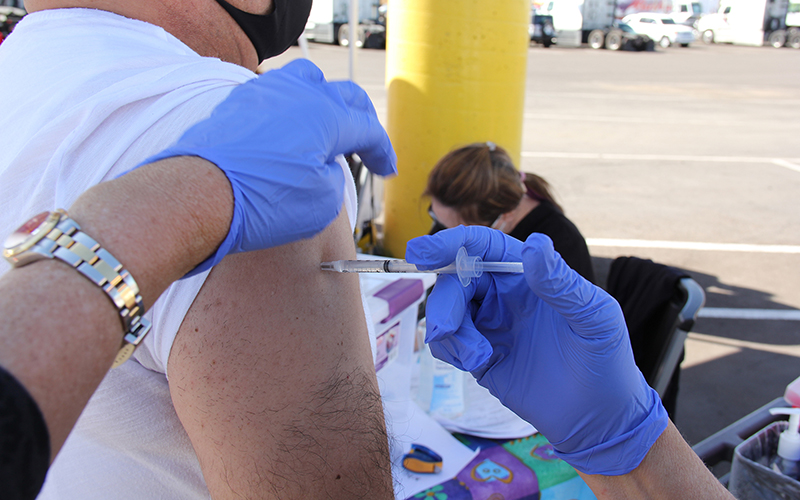Relationships and Going Places
Jo Freeman: There’s Plenty To Do at the RNC – If You Have the Right Credentials
by Jo Freeman
Every national nominating convention has plenty of auxiliary events, some authorized, some not. Getting space can be a challenge; getting the word out even more so. But they do it nonetheless. Press were given a RNC 2024 Master Event Calendar, which was updated a few days later. Events began on Sunday and ended on Thursday. The actual convention sessions were just one item on the list. The calendar said if an event was Open or Closed to press, and also whom to contact to register. I’m going to describe some of the events, including a couple I went to, and a couple I was turned away from.
Since my focus is on women, I obviously wanted to go to those events – if I could.
The National Federation of Republican Women is the largest grassroots Republican women's organization in the country with hundreds of clubs. Founded in 1938, its members made the phone calls and knocked on the doors that elected Republican candidates for decades. It’s Tuesday luncheon featured Arkansas Governor Sarah Sanders. The Master Calendar said it was SOLD OUT and they wouldn’t let me in. I was able to get into their lounge at the Fiserv Forum Wednesday evening, where I was repeatedly asked if I was a member, and if not, would I join. “I’m press,” I said. “I can’t join anything partisan.” I then said: “What brings you here?” On hearing that, finding anyone willing to chat with me was like pulling teeth.
Moms for Liberty met in a concert hall that afternoon. I had pre-registered, and I got in. From high in a balcony seat I listened to several people talk about the evils of transgenderism. It’s webpage says WE BELIEVE Power Belongs to the People. Sound Familiar? With a focus is on parental rights, it wants to “STOP WOKE indoctrination.”
Tuesday I went to “The New Mavericks” reception co-hosted by the Black Republican Mayors Association and the Georgia Republican Party. They honored Sen. Tim Scott, four Congressmen and two Georgia delegates – all male. There was only one mayor on stage, from Aurora, IL. The chair of the Georgia Republican Party was the one white man on the stage. At that event, women served; they didn’t speak. The RNC reported that 55 delegates to the 2024 convention are Black, up from 18 in 2016.
I missed the Independent Women’s Forum toast to “Women Who Make Our Country Great” because I went to Convention Fest: The Official Delegate Experience, which was held in the streets outside the Fiserve Forum and Baird Hall as well as some space inside Baird. To get to that one you not only needed a credential of some sort, but a USSS pass (which I have).
Concerned Women for America parked its pink bus across from the Baird Center the week before the RNC. No one was home. When Convention Fest opened on Tuesday afternoon, they set up a pink tent, from which its leaders preached to whomever passed by. It calls itself “the nation’s largest public policy women’s organization” but its focus is evangelical Christian. The slogan on the side of its pink bus captures this emphasis: “She Prays, She Votes.” A prayer precedes each sermon.
 JAMA Otolaryngol Head Neck Surg: Growing Public Health Concern of COVID-19 Chronic Olfactory Dysfunction
JAMA Otolaryngol Head Neck Surg: Growing Public Health Concern of COVID-19 Chronic Olfactory Dysfunction
"This analysis of new daily cases of COVID-19, acute incidence of OD [Olfactory Dysfunction], and rates of recovery suggest that more than 700,000, and possibly as many as 1.6 million, US individuals experience COD because of SARS-CoV-2. To put this number in context, before the COVID-19 pandemic, the National Institute on Deafness and Other Communication Disorders estimated that, among US adults 40 years or older, measurable OD was found in up to 13.3 million adults.6 Notably, the age-specific prevalence of OD is 4.2% for individuals between age 40 to 49 years and 39.4% for individuals 80 years and older." "The loss of olfaction has been associated with decreased general quality of life, impaired food intake, inability to detect harmful gas and smoke, enhanced worries about personal hygiene, diminished social well-being, initiation of depressive symptoms." more »
 EPA Advances Science to Protect the Public from PFOA and PFOS in Drinking Water
EPA Advances Science to Protect the Public from PFOA and PFOS in Drinking Water
"EPA will not wait to take action to protect the public from PFAS exposure. The agency will be actively engaging with its partners regarding PFOA and PFOS in drinking water, including supporting their monitoring and remediation efforts. Importantly, the Bipartisan Infrastructure Law, signed by President Biden on November 15, 2021, invests $10 billion to help communities test for and clean up PFAS and other emerging contaminants in drinking water and wastewater, and can be used to support projects in disadvantaged communities" more »
 GAO: Vaccine Development: Capabilities and Challenges for Addressing Infectious Diseases
GAO: Vaccine Development: Capabilities and Challenges for Addressing Infectious Diseases
Policymakers could provide support for public-private partnerships to strategically address potential pandemic pathogens identified as priorities. These partnerships could, for example, develop and test vaccine candidates that may provide protection from pathogens with pandemic potential. This early development could provide a coordinated foundation that can be mobilized in an emergency. Such an approach could speed vaccine development as well as potentially reduce risk for vaccine researchers and developers concerning questions of safety, efficacy, and manufacturability. The lack of certainty of the commercial market and government funding for vaccines against pathogens with pandemic potential may be too risky for the private sector to undertake. more »
 National Institutes of Health Supported Research Will Track Effects of COVID-19 Infection On Children Over Three Years
National Institutes of Health Supported Research Will Track Effects of COVID-19 Infection On Children Over Three Years
A large, long-term study of the impacts of COVID-19 on children has enrolled its first participant at the National Institutes of Health’s Clinical Center in Bethesda, Maryland. The study, which is supported by the National Institute of Allergy and Infectious Diseases (NIAID), part of the National Institutes of Health, will track up to 1,000 children and young adults who previously tested positive for COVID-19 and evaluate the impact of COVID-19 on their physical and mental health over three years. The study is expected to yield a detailed picture of COVID-19’s effects on the overall health of children, their development and immune responses to infection, and their overall quality of life in the years following infection. more »






